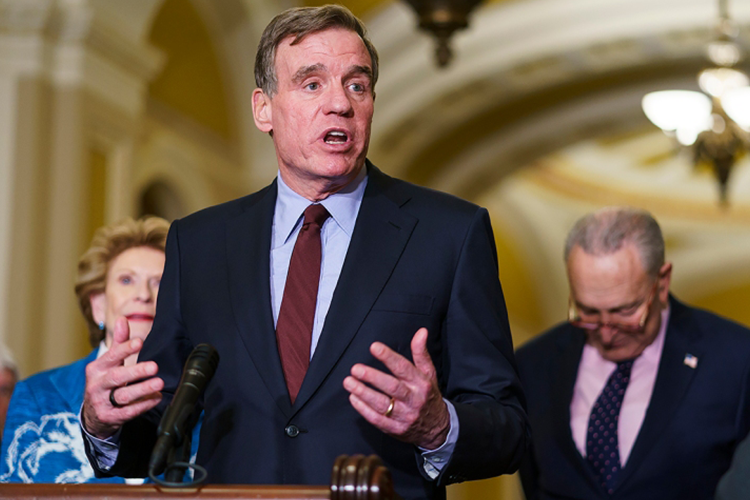
Sen. Mark Warner and supporters of the bill announce the RESTRICT Act. photo By Greg Nash
The RESTRICT Act is a new piece of legislation currently being debated in the House and Senate that is facing many criticisms for its vague language.
It’s no surprise that TikTok, an app with 2.5 billion daily users worldwide, has come under scrutiny for concerns about privacy and security in the United States. A number of countries have enacted bans on the popular app. India had completely banned the app in early 2021 because of their border disputes with China. Meanwhile, institutions in the European Union have banned TikTok on the devices of staff in the European Parliament, the European Commission and the EU Council because of cybersecurity reasons. At national levels, France, Estonia, and Norway have now banned TikTok on government owned devices, including smartphones, because of similar security concerns. Now, here in the United States there are efforts to ban TikTok, through the RESTRICT Act (Restricting the Emergence of Security Threats that Risk Information and Communications Technology).
Recently, the Biden administration approved a limited TikTok ban, only affecting government owned devices, with exceptions on devices with law enforcement and national security. TikTok’s CEO, Shou Zi Chew, testified before Congress in late March, with the main subject being concerns over American users’ data being handed over to the Chinese government. However, TikTok isn’t accessible in China. There is a similar app named Douyin, with over 600 million daily active users. Both apps were developed by their parent company ByteDance, which is based in China. Think of TikTok as the global version of the Douyin app, having similar features; however, Douyin is mainly used for online shopping. Douyin’s user base is mostly adults, and it has restrictions for their younger users. Users under the age 14, can only use the app for 40 minutes a day and cannot use the app from 10 p.m. to 6 a.m.. TikTok doesn’t have these restrictions, and there have been concerns over users’ health; however, this ban does not address these worries.
TikTok, like other social media apps, collects user data such as search history. Users’ email addresses and phone numbers are collected once they first make an account on the app. General location information is also collected with the wifi network that is used to access the device. This is, of course, similar to other social media apps such as Instagram and Snapchat. However, Congress’ main concern is the Chinese ownership of the app. There have been concerns that the Chinese government has the ability to forcefully obtain data from companies based in China. This is due to their Cybersecurity Law which requires businesses operating within China to store business, tech, and personal data. And with TikTok’s company, ByteDance, being based in China, how safe will classified information and data from American citizens be from the Chinese government? It’s not necessarily always foreign apps and websites that are leaking sensitive information. Recently, Pentagon documents were leaked by a 21 year old U.S Airmen through the messaging app Discord, which is based in San Francisco, California. Hundreds of documents involving highly sensitive information about the Russia-Ukraine War were leaked.
Lawmakers are backing the RESTRICT Act as the piece of legislation that will ban TikTok. This bill was proposed by Mark Warner, Democratic Senator of Virginia, and so far has support from both sides of the aisle. The RESTRICT ACT, gives the “Secretary of Commerce and the president the authority to review business transactions between persons in the United States and foreign adversaries, and for other purposes.” It authorizes them to not only review, but also take appropriate measures against Information and Communications Technologies (ICTs) that are controlled by “foreign adversaries” that could pose a threat to national security in the United States. However, despite many lawmakers supporting this bill in order to ban TikTok, the app isn’t mentioned. Neither is ByteDance or even social media. Instead, it uses vague language such as “information and communication technology products.” Violations of “any regulation, order, direction, mitigation measure, prohibition, or other authorization or directive issued” can result in criminal penalties, from up to 20 years in prison, and one million dollars in fines. This bill has faced criticism by many groups such as the Foundation of Individual Rights and Expression, for vague language (referring to online apps and services as “information and communication technology products”), the lack of judicial oversight, and the lack of transparency. The American Civil Liberties Union and the Electronic Frontier Foundation also have concerns that this act, when passed, could give the executive branch more power. The RESTRICT Act is still being debated in the House and Senate, so the future of the Act and TikTok is still up in the air.